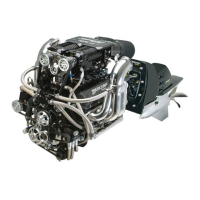MAINTENANCE
43
Replacement Service Parts
!
WARNING
Avoid fire or explosion hazard. Electrical, ignition and fuel system
components on Mercury Marine gasoline power packages are designed
and manufactured to comply with U.S. Coast Guard rules and regulations
to minimize risks of fire or explosion.
Do not use replacement electrical, ignition or fuel system components,
which do not comply to these rules and regulations.
When servicing the electrical, ignition, and fuel systems, it is extremely
important that all components are properly installed and tightened. If not,
any electrical or ignition component would permit sparks to ignite fuel
vapors from fuel system leaks, if they existed.
Marine engines are expected to operate at or near full throttle for most of
their life. They are also expected to operate in fresh and saltwater
environments. These conditions require numerous special parts. Care
should be exercised when replacing marine engine parts, as specifications
are quite different from those of the standard automotive engine.
For example, one of the most important, and probably the least suspected
special replacement part, is the cylinder head gasket. Since saltwater is
highly corrosive, the steel‑type automotive head gasket cannot be used. A
marine engine head gasket uses special materials to resist corrosive
action.
Since marine engines must be capable of running at or near maximum
RPM much of the time, special valve springs, valve lifters, pistons,
bearings, camshafts and other heavy‑duty moving parts are required for
long life and peak performance.
These are but a few of the many special modifications that are required in
Mercury Marine engines to provide long life and dependable performance.
Do‑It‑Yourself Maintenance Suggestions
If you are one of those persons who likes to do‑it‑yourself, here are some
suggestions for you.
• Present‑day marine equipment, such as your Mercury Marine power
package, are highly technical pieces of machinery. Electronic ignition
and special fuel delivery systems provide greater fuel economies, but
are more complex for the untrained mechanic.
• Do not attempt any repairs that are not covered in this manual unless
you are aware of the precautions (Cautions and Warnings) and
procedures required. Your safety is of our concern.

